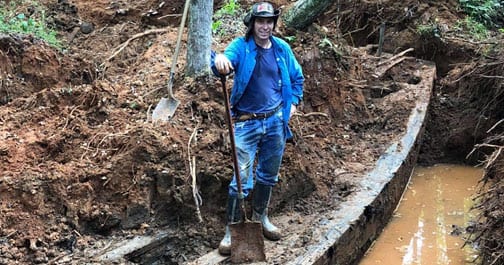Anyone interested in learning how prospectors once set up camp in the northeast corner of Franklin County in search of gold will feel like they hit the mother lode when talking with Tim Fisher.
Fisher is a wealth of information about the Gold Run Branch gold mine, often called the Portis Mine by locals. And he spoke with Bill Harris on Monday’s Town Talk to give an update on another project that he and some dedicated volunteers have been working on – excavating a 94-foot-long bucket-line dredge that was found on the property.
The previous owner of the land had speculated that it was probably just a dam left over from when the gold mine was in full operation, Fisher said. But a couple of years ago, thanks to a couple of long, dry spells and the work of some pesky beavers along the branch, Fisher discovered something else entirely.
He got busy on the computer and found some mining journals with photos of the dredge, which is a floating vessel that used buckets on the front to scoop from the waterway floor, allowing the heavy gold to sink to the bottom of the dredge. The culled material would go off the back of the dredge, leaving the valuable gold inside.
Now that the dredge is partially excavated, Fisher said they’ve made some neat discoveries, like an old smelter in an assay lab. A smelter is like an oven or kiln that was used to melt the gold to test its purity. “It’s a cool, cool, rare piece of history,” Fisher said.
“We’ve figured out how to reconstruct it,” he said of the giant relic, adding that the plans are to make it totally safe for people. “We’re not planning to float it again,” Fisher said, but they do plan to restore it so others can see what it looked like when it was in use.
One by-product of the excavation is all the dirt and silt that has washed through the dredge over the years that it was abandoned. There are big bags of that excavated dirt that are ripe for modern-day prospectors to sift through in search of gold.
Any gold heavy enough would have sunk to the floor of the dredge, he explained. “There’s gold in it,” he said of the dirt they’ve pulled out so far. “When we pull the dirt out, there’s gold in it,” he said.
Some folks came out recently and said they’d like to try their hand at panning for gold in the creek. After a quick clinic to learn some techniques, Fisher said they had no trouble finding gold, which they took home in a small vial.
“It’s an unbelievable situation up here,” Fisher said with enthusiasm. He said he hopes he can play even a small role in attracting more tourism up his way.
“There’s so much to see and to learn – I want to teach the younger generation how things used to be,” Fisher said. He’s also filming the dredge excavation project, and the end result is either going to be a documentary or a series that chronicles the project.
“I can’t even tell you how intensive this job is going to be,” he said, undaunted. The site is a little tricky to get to and the heavy equipment can’t get too close, so volunteers alongside Fisher are literally placing the dirt in the bucket of the excavator shovelful by shovelful.
“There is no quick way to do it…you don’t want to destroy, damage or crush stuff,” he said.
Visit Eastern Outdoor Expedition’s Facebook page to see videos of the progress and to learn more about making a trip to the location.
Fisher’s son, Ross, operates NC Treasure Hunters Campground and there are sites available for weekend campers who want to reserve an adult-size tepee or stay in a converted prospector’s cabin. There also are primitive camping facilities that have fire pits and picnic table. It’s a family-oriented recreation area, Fisher said. Contact them via their Facebook page or call 252.245.1197.
Click Play!
